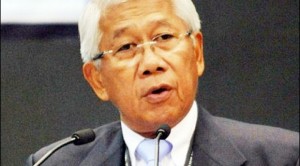Defense Secretary Voltaire Gazmin had expected critics to react negatively after President Benigno Aquino III appointed Maj. Gen. Hernando Iriberri as the new Army commander.
Iriberri is closely identified with Gazmin.
“We were discussing the issue … We were discussing how do we manage this because they (critics) will start speculating because Iriberri is the youngest [among the front-runners] and was identified with me. We were anticipating this problem. What I said was, we just have to bite the bullet. This is for the good of the organization,” Gazmin told the Inquirer in an interview yesterday, adding he had discussed the matter with the President and Armed Forces of the Philippines Chief of Staff Gen. Emmanuel Bautista.
True enough, a week after Iriberri formally assumed his post, rumors abound that Iriberri got the President’s nod because of the “Board of Gazmin,” a reference to the defense chief’s alleged practice of dictating to the President who to place in key military positions.
“That ‘Board of Gazmin,’ that irritates me because I do not meddle with the selection process. When it comes to my table, the recommendation is already signed by the Board of Generals,” Gazmin said in Filipino.
In April, Philippine Air Force Commanding General Lt. Gen. Lauro Catalino de la Cruz will be retiring, to be followed by Philippine Navy Flag Officer in Command Vice Adm. Jose Luis Alano in May.
In July, Bautista will be stepping down as military chief upon reaching the mandatory age retirement of 56.
Gazmin said President Aquino conferred with him and Bautista on the possible military appointments. But ultimately, it is the President who makes the final decision, he said.
Iriberri was a member of the Philippine Military Academy (PMA) ’83 while the other front-runners were northern Luzon command chief Lt. Gen. Gregorio Catapang of PMA ’81 and Central Command chief
Lt. Gen. John Bonafos of PMA ’82.
Ties that bind
Gazmin said Iriberri’s accomplishments should reflect his capabilities as a leader and must not be overshadowed by the ties that bind the two of them, such as the latter’s being the defense chief’s former spokesperson and senior military assistant.
“It is unfair to me, General Bautista, General Iriberri and especially the President,” he said.
Gazmin described the President as a “decisive leader” who knows how to choose his military commanders well.
The selection process for top military commanders goes through the Board of Generals, which in turn submits a recommendation to the AFP chief of staff. The military chief elevates it to the defense chief, who finally endorses it to the President, the final appointing authority.
Step by step, Gazmin said, the candidates are vetted, with their military records on paper showing their capabilities.
But the final showdown, so to speak, is the interview with the commander-in-chief, where the front-runners start on a clean slate.
Make or break
Gazmin said the President had a way of interviewing his top commanders for a key post, giving them the chance to show the kind of leaders they would be.
It can make or break one’s chances, Gazmin said.
Gazmin prides himself as being a good mentor, noting that a number of the junior officers who were his platoon leaders or staff officers ultimately made it to the top.
Some of them, like retired Generals Hermogenes Esperon, Alexander Yano and Victor Ibrado, became AFP chiefs of staff under then President Gloria Macapagal-Arroyo.
At that time, Gazmin was out of government service and was even practically on the other side of the political fence because the late President Corazon Aquino was a staunch Arroyo critic.
Gazmin also noted that a number of military officers now heading unified commands, like Air Force Lt. Gen. Rey Deveraturda, chief of the Western Command; Army Lt. Gen. Rainier Cruz, chief of the Eastern Mindanao Command, and Marine Lt. Gen. Rustico Guerrero, chief of the Western Mindanao Command, were never under his command.
“But look at where they are now,” Gazmin said.
RELATED STORIES
36 AFP modernization projects completed under Aquino, says Gazmin
Gov’t spent P41B for AFP modernization since 2010
2013 a challenging year for the military—AFP chief
